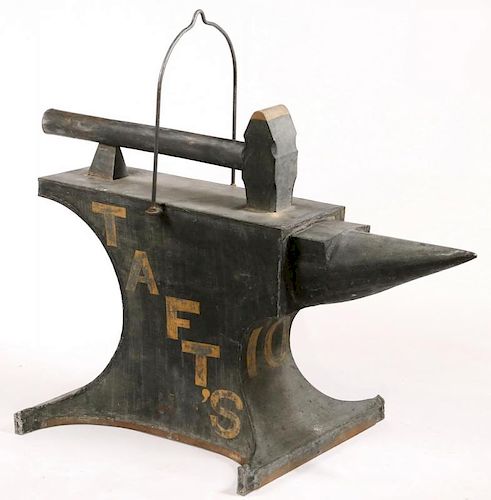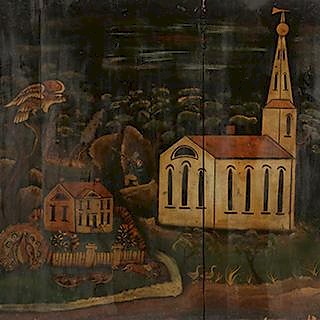TAFT BLACKSMITH TRADE SIGN
Lot 375
Categories
Estimate:
$7,000 - $9,000
Absentee vs Live bid
Two ways to bid:
- Leave a max absentee bid and the platform will bid on your behalf up to your maximum bid during the live auction.
- Bid live during the auction and your bids will be submitted real-time to the auctioneer.
Bid Increments
| Price | Bid Increment |
|---|---|
| $0 | $10 |
| $100 | $25 |
| $500 | $50 |
| $1,000 | $100 |
| $2,500 | $250 |
| $5,000 | $500 |
| $10,000 | $1,000 |
| $15,000 | $2,500 |
| $50,000 | $5,000 |
| $100,000 | $10,000 |
About Auction
By Thomaston Place Auction Galleries
Feb 11, 2017 - Feb 13, 2017
Set Reminder
2017-02-11 11:00:00
2017-02-13 11:00:00
America/New_York
Bidsquare
Bidsquare : 2017 Winter Feature Auction, Day 1
https://www.bidsquare.com/auctions/thomaston-place/2017-winter-feature-auction-day-1-2100
Thomaston Place Auction Galleries info@thomastonauction.com
Thomaston Place Auction Galleries info@thomastonauction.com
- Lot Description
Painted Tin Anvil and Hammer Hanging Sign marked "Taft's", from Millville, Mass, 19th c., 41" x 50" x 25". Good condition, nice patina. Possibly from the smithy that was inspiration for Longfellow's poem "The Village Blacksmith" of 1840. There is contention about this vs. Dexter Pratt's Brattle Street, Cambridge smithy. Taft's was located at the intersection of Vineyard, Chestnut and Mendon Streets in what is now Millville. The first Taft to work the shop was Japhet, who had the forge built in 1787. Japhet passed it on to Luther, who in turn gave it to his son Caleb. From the Taft Family newsletter of November 1996 newsletter: "Recent information from cousin Don Taft of Ashtabula, OH informs us that the old blacksmith shop established by Caleb Taft in Millville, Mass. (then part of Mendon) in 1726, and removed to Greenfield Village in Dearborn, Michigan, by Henry Ford in 1926, is currently in use by the museum. Visitors may find it near the Allegheny locomotive at the Business Entrance, where a little niche has been provided for a security person in one corner of the blacksmith shop. Many of the blacksmithing tools have been dispersed throughout the museum and village. Some are on display in the Made in America exhibit, and some are being used at the village forge. Don received this information from Linda Skolarus of the museum staff, who also provided copies of some interesting reports turned in by W. W. Taylor, a dealer who purchased the shop and tools for Ford." On March 13th, 1926 Taylor reported that, a year before they had bought the shop itself, many of the tools had been sold to a Frenchman up the road a bit from the shop. Visiting him that day, Taylor found them stored in his barn, and they consist of almost every conceivable kind of small tool which would ever be likely to be used by any blacksmith or wheelwright, and a lot more besides, including a whole barn loft full of old wooden patterns of all sorts of wagons and wooden machinery... a very large and good anvil.. a stake iron for making hand forged nails, set in a section of tree trunk... special tools for setting tires, a large lot of extra good old hinges of different patterns etc. etc. He bought the whole lot, so we can assume that they are now to be found in Ford's Greenfield Village Museum."
- Shipping Info
-
We have hired Global Packing & Shipping (GP&S) as our designated shipper. Shortly after the auction, you will receive an email from them with a quote for shipping. Quotes for shipping large items may take longer.
For pre-auction quotes or other information please contact:
Global Packing & Shipping
Phone: 207-236-2926 or 207-594-2926
Email: global@midcoast.com
Include Lot number and shipping address.
-
- Buyer's Premium



 EUR
EUR CAD
CAD AUD
AUD GBP
GBP MXN
MXN HKD
HKD CNY
CNY MYR
MYR SEK
SEK SGD
SGD CHF
CHF THB
THB












